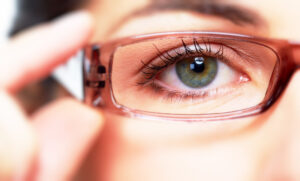[et_pb_section bb_built=”1″][et_pb_row][et_pb_column type=”4_4″][et_pb_text _builder_version=”3.0.106″ background_layout=”light”]
 Non-glare (or anti-reflective) coating is a common and cost-effective feature that many eyeglass wearers elect to have put on their lenses. It’s one of those things that you usually don’t notice or think about when you have it, but you notice when it’s not there!
Non-glare (or anti-reflective) coating is a common and cost-effective feature that many eyeglass wearers elect to have put on their lenses. It’s one of those things that you usually don’t notice or think about when you have it, but you notice when it’s not there!
Non-glare lenses are simply lenses that have this anti-reflective coating applied to the lens. Anti-reflective coating works by eliminating the reflections of light from the front and back the lens. Typical anti-reflective coating allows 99.5 percent of light to pass through, meaning that there is only a very faint hint of light on the lens even in the brightest conditions. The anti-glare protection allows more light to come through, and results in better vision for you as well as a better view for others. When people look at you, they won’t see a glare off of the lenses of your glasses. Glares off of your glasses can ruin pictures and be distracting to people speaking with you because the glare obscures the view of your eyes.
Beyond the cosmetic reasons, the largest benefits of anti-reflective coating are sharper vision when driving at night, and more comfort when using a computer for long periods of time. You won’t experience a glare from the computer screen, and the sharper vision will mean easier focusing for your eyes.
It’s also a good idea get the anti-reflective coating applied to the back surface of your sunglasses. This helps eliminate glare from sunlight when the sun is behind you. Most AR coatings now also include a layer that prevents water spots, thus making them much easier to clean. There are even coatings that help resist skin oils while also making smudges easier to wipe off.
Glasses that have anti-reflective coating should be given special care, as some lens cleaners contain chemicals that could damage the anti-reflective coating. With any eyewear, make sure you know how to care for your gear to give it a long and useful life. Ask your eye care professional if you have questions about care for your eye wear, or would like to know more about anti-glare options.
[/et_pb_text][/et_pb_column][/et_pb_row][/et_pb_section]

